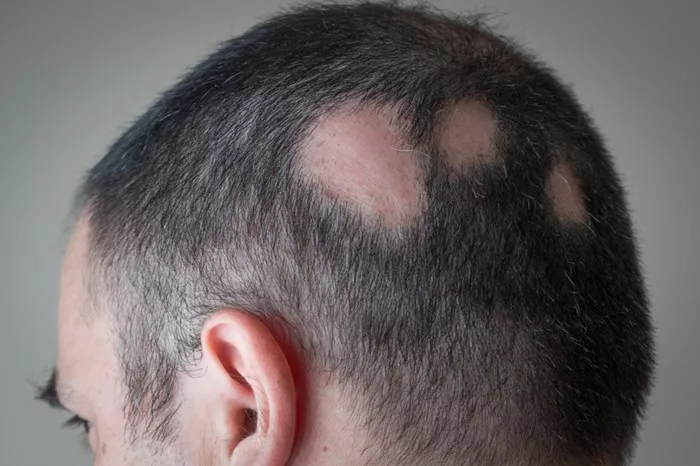Alopecia areata is a challenging autoimmune condition characterized by sudden hair loss that can occur on the scalp, eyebrows, eyelashes, facial hair, and body hair. While it isn’t painful or itchy for most individuals, the emotional impact of losing hair unexpectedly can be significant. In this comprehensive guide, we’ll delve into the nuances of alopecia areata, explore available treatment options, and discuss lifestyle strategies for coping with this condition.
Understanding Alopecia Areata:
Alopecia areata is an autoimmune disease where inflammatory cells mistakenly attack the hair follicles, leading to hair loss. The exact cause of this condition is not fully understood, but it is believed to involve a combination of genetic, environmental, and immune system factors. Here’s what you need to know:
Autoimmune Nature: In alopecia areata, the body’s immune system mistakenly targets the hair follicles, resulting in hair loss.
Symptoms: Hair loss typically occurs in small, round patches on the scalp, although it can also affect other areas of the body.
Asymptomatic: While hair loss is the primary symptom of alopecia areata, the condition is usually asymptomatic and does not cause pain or itching for most individuals.
Treatment Options:
Managing alopecia areata can be challenging, as there isn’t a one-size-fits-all approach. Treatment options vary depending on the severity of the condition and individual response. Here are some common treatment options:
Corticosteroid Injections: These injections help modulate immune system activity and reduce inflammation in the affected area. They are often used for mild cases of alopecia areata.
Janus Kinase (JAK) Inhibitors: JAK inhibitors are drugs that suppress immune responses and promote hair regrowth. They are considered for more severe or widespread cases of alopecia areata.
Topical Treatments: Prescription creams or lotions containing corticosteroids or other medications may be applied directly to the affected areas to prevent immune attacks on the hair follicles.
In-Office Therapies: Dermatologists may offer in-office treatments such as injections or topical therapies to help stimulate hair regrowth.
Minoxidil (Rogaine): Over-the-counter minoxidil solution can stimulate hair growth and may be used as an adjunct treatment for alopecia areata.
Antiviral Drugs: Some studies suggest that antiviral medications may help in certain cases of alopecia areata, although more research is needed to confirm their effectiveness.
Immunosuppressant Drugs: These medications work by suppressing the immune system’s activity, preventing it from attacking the hair follicles.
Lifestyle and Coping Strategies:
In addition to medical treatments, adopting certain lifestyle habits and coping strategies can help individuals manage alopecia areata more effectively. Here are some suggestions:
Stress Reduction: Stress can exacerbate alopecia areata, so it’s essential to find healthy ways to manage stress levels. This may include practicing relaxation techniques such as meditation, yoga, or deep breathing exercises.
Protective Styling: Wearing wigs, hats, or scarves can help cover hair loss and protect the scalp from the sun’s harmful rays. Experiment with different styles and accessories to find what works best for you.
Support Groups: Joining a support group or connecting with others who have alopecia areata can provide valuable emotional support and practical tips for coping with the condition.
Conclusion:
Alopecia areata can be a challenging condition to manage, but with the right approach, individuals can effectively cope with hair loss and promote hair regrowth. By understanding the nature of alopecia areata, exploring available treatment options, and adopting healthy lifestyle habits, individuals can take control of their condition and minimize its impact on their daily lives.
For additional information and support, consider consulting reputable sources such as Healthline, Harvard Health, GoodRx, and WebMD. Remember, you’re not alone in your journey with alopecia areata, and there are resources and treatments available to help you navigate this condition with confidence and resilience.
you may be interested

